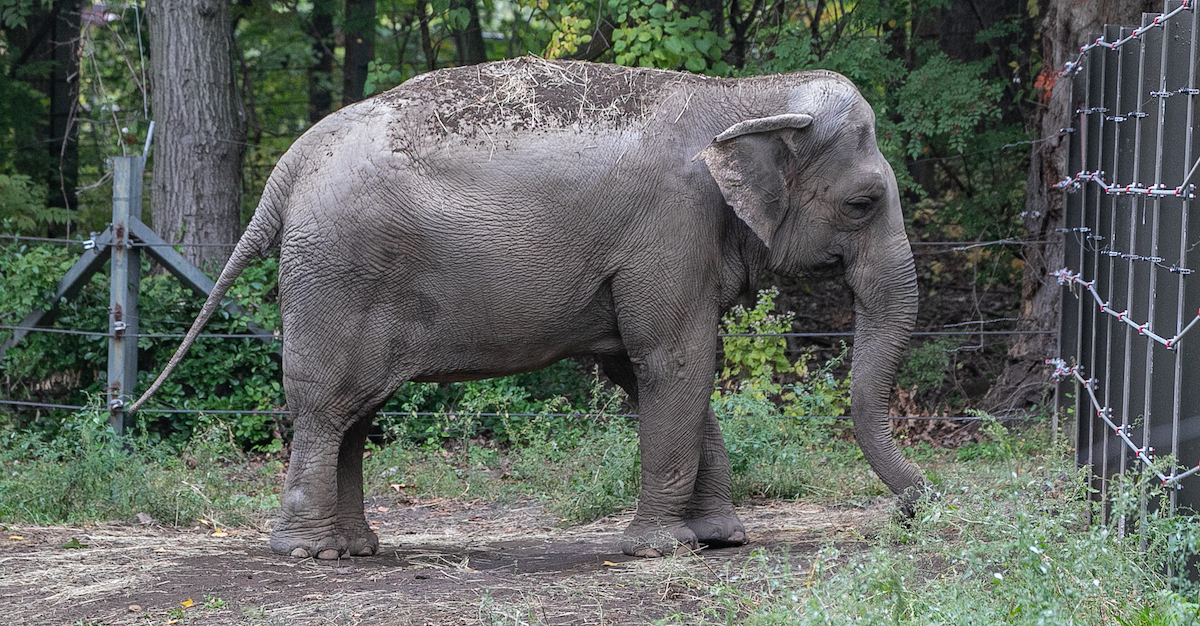
Happy the Elephant
An elephant confined in the Bronx Zoo for decades is not a “person,” a divided panel of New York’s highest court ruled on Tuesday.
“A determination that Happy, an elephant, may invoke habeas corpus to challenge her confinement at the Bronx Zoo—a confinement both authorized and, by all indications, compliant with state and federal statutory law and regulations—would have an enormous destabilizing impact on modern society,” Chief Judge Janet DiFiore, from the Court of Appeals, wrote on behalf of the 5-2 majority. “It is not this Court’s role to make such a determination.”
The 17-page majority ruling ends the roughly four-year quest of the Nonhuman Rights Project to release the female Asian elephant from the Bronx Zoo, where she has lived since 1977.
Happy had been born in the wild some six years earlier in 1971—and holds the distinction as the first elephant to pass the mirror self-recognition test, considered to be an indicator of self-awareness.
On Oct. 2, 2018, the animal rights group filed a habeas petition in New York County Supreme Court, as part of its global campaign to expand what they describe as the fundamental rights of animals. The Nonhuman Rights Project counted the Court of Appeals decision last year to hear Happy’s case as a “giant step” for their movement, but the top court’s majority found ruling in their favor would be a slippery slope.
“Granting legal personhood to a nonhuman animal in such a manner would have significant implications for the interactions of humans and animals in all facets of life, including risking the disruption of property rights, the agricultural industry (among others), and medical research efforts,” DiFiore wrote. “Indeed, followed to its logical conclusion, such a determination would call into question the very premises underlying pet ownership, the use of service animals, and the enlistment of animals in other forms of work.”
Judges Michael Garcia, Madeline Singas, Anthony Cannataro and Shirley Troutman concurred with the majority ruling.
If they ruled the other way, the majority added, courts would be flooded with petitions over such disputes—with “no clear standard” for resolution.
Two dissenting judges grappled with the philosophical and historical background of the habeas fight, spanning back some four centuries to René Descartes.
“The idea of a habeas petition on behalf of an elephant would have seemed ludicrous to Descartes, who saw animals as inanimate, insentient objects,” Judge Rowan Wilson noted in a dissent joined by Judge Jenny Rivera. “Given what we know today, it would be even more absurd to allow Descartes’s views to factor into a decision concerning Happy’s ability to seek relief through habeas corpus, when human understanding of elephant cognition, social behavior, capabilities and needs demonstrates the absurdity of those ancient, uninformed views.”
Wilson’s dissent opens with a grim history of Bronx Zoo exhibitions of old, including human beings. In 1906, the zoo housed Ota Benga, a member of the Mbuti people, in a monkey house. Benga’s route to captivity in the zoo was paved through South Carolina white supremacist Samuel Verner, who had been hired to remove “pygmies” from the Belgian Congo.
For Judge Wilson, that past was prologue.
“That same zoo has confined Happy the elephant for the past 40 years,” his dissent began. “Unquestionably, Mr. Benga was a human being; Happy is not. Human beings should have greater rights than elephants, if only because we make the rules. The crucial point from both Mr. Benga’s and Happy’s confinement, though, is that both suffered greatly from confinement that, though not in violation of any statutory law, produced little or no social benefit.”
Wilson wrote that the case broke down to more than a question of semantics over what has been called the “Great Writ” of habeas corpus.
“The question here is not whether Happy is a ‘person’—Happy is an elephant,” he wrote. “The question is not whether Happy’s detention violates some statute: historically, the Great Writ of habeas corpus was used to challenge detentions that violated no statutory right and were otherwise legal but, in a given case, unjust.”
The Nonhuman Rights Project applauded the dissenting judges, counting them among the “growing body of judges from around the world who are considering and recognizing nonhuman animals as rights-holders.”
Ecuador’s Constitutional Court, the highest court in the country, recognized animal rights in a nation whose constitution already afforded rights to nature.
The group is separately pursuing a elephant rights case in California and announced plans to file other such cases around the world in the coming months.
“We have persuaded three judges on New York’s highest court since 2018; we know we’ll persuade more,” the group wrote in a statement.
The group also echoed one of Judge Wilson’s sentiments.
“When the majority answers, ‘No, animals cannot have rights,’ I worry for that animal, but I worry even more greatly about how that answer denies and denigrates the human capacity for understanding, empathy and compassion,” Wilson wrote.
For the majority, the dissent likening Happy’s captivity to that of “abused women and children and enslaved persons” is an “odious comparison with concerning implications.”
“We are unpersuaded,” they added.
The zoo’s spokesperson did not immediately respond to Law&Crime’s email requesting comment.
Read the ruling, below:
[Photo via Gigi Glendinning, courtesy of the Nonhuman Rights Project]